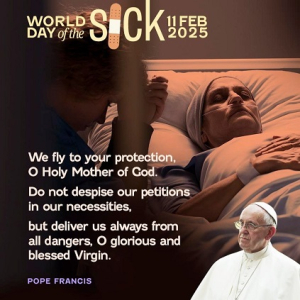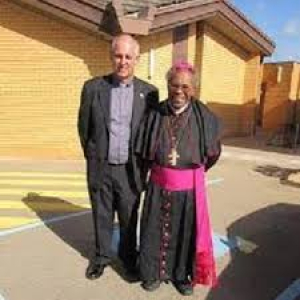Peter MALONE
Sebastian/ 2024

SEBASTIAN
UK/Finland, 2024, 110 minutes, Colour.
Ruaridh Mollica, Hiftu Quassem, Jonathan Hyde, Ingvar Sigurdsson, Dylan Brady.
Directed by Mikko Mäkelä.
Sebastian is a challenging drama, a British film directed by a Finnish director. Its central character is played by a British/Italian actor, Ruaridh Mollica, with a supporting cast of Scandinavian actors and a strong performance from Jonathan Hyde.
The film is sometimes graphic and explicit in its scenes of sexual encounters.
Max is from Scotland, a talented writer, a short story in the British magazine, Granta, now working on his novel, encouraged by fellow writers with interviews from literary editors. He is highly ambitious for a successful career.
Max is homosexual. He decides to do some research for his writing, setting himself up online as an escort. He meets up with the various men, the sexual encounters, payment. And he begins to write about these encounters, in the third person, his friends and editors not suspecting his activities.
Max creates an online persona for himself, Sebastian, and as the film develops, there is the character of Sebastian, friendly, accommodating, sexually active. But there is also the writing obsessed Max, and the challenge to his two personalities when he encounters a retired writer and editor, Jonathan Hyde, and forms a personal relationship even while observing his behaviour and writing.
Ultimately, some overreaching of himself, criticisms from the friends he lets down, the editors suggesting that the writing is becoming tedious, another encounter with a client which leads to violence and his exposure, stranded in Amsterdam, having to face up to himself, his hopes, some integrity. The audience is not sure that this will happen.
- The title, the working name, Max and Sébastian?
- The London settings, flats, offices, editorial rooms, literature occasions? The contrast with Sebastian’s work, hotels, rooms, clubs? The Amsterdam sequences, clubs, the streets? The musical score?
- The double character drama, the touch of Jekyll and Hyde? Max, his age, Scottish background, family and contact with his mother, his skill in writing, his ambitions, the publication of his story in Granta, further stories and encouragement, the publishing firms and editors and their discussions and encouragement? His friendship with Amna? Her work, comments, affirmation? Acknowledging himself as a gay man?
- Going online, his decision about his story, creating the name of Sebastian, enrolling himself, the photos, the provocative descriptions? His decision to act as an escort rather than just observing? His encounters, the initial encounter with the older man, the relationship with the client, the discussions, the sexual activity, the aftermath? The encounter with Daniel, married, his response to Daniel, Daniel appreciating that he did not lie about himself?
- Seeing him of the typewriter, his creativity, bringing the manuscripts for consideration, the variety of responses, from Amna, editors, the believing he was observing and writing creatively? The shift to writing in the first person, as Sebastian?
- The development of the manuscript, the encouragement of the editors, the publishing plans, the prospect of money, added to the money coming in from the clients? The editors and their criticisms, wanting it more personal, the validity of the criticism that in his becoming more settled as Sebastian, companionship, the audience was losing interest?
- The encounter with Nicholas, literary background, age, manner, teaching, reticent, the gradual relationship? Sebastian and his response, his being changed in this relationship? But still observing? And encountering Nicholas at the literature function? The discussions with Nicholas, about his writing, Nicholas and his encouragement, and Nicholas revealing his story, his literary work, editing, and his long-term relationship, the death of his companion?
- The dilemma for Sebastian/Max, which name to introduce himself with? To continue as an escort? The next meeting with Daniel, the sexual aspects, his reticence, Daniel discovering the truth about him, the violent response? Ousting him, not giving him his wallet, Max wandering the streets, at the bar, the encounter with the young man, asking for money, the young man spitting on him?
- Ringing for the money, his return to England?
- His prospects, the truth about himself, the relationship with Nicholas, the friendship with a, the development of his writing?
September 5
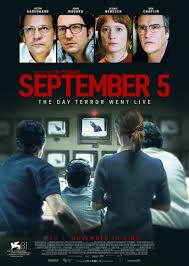
SEPTEMBER 5
Germany/US, 2024, 95 minutes, Colour.
Peter Sarsgaard, John Magaro, Ben Chaplin, Leonie Benesch, Zinedine Soualem, Georgina Rich, Corey Johnson, Marcus Rutherford, Benjamin Walker.
Directed by Tim Fehlbaum.
September 5,1972 was a significant date for terrorism in the 20th century, the Munich Olympic Games, the attack on the Israeli team in the Olympic village, the terrorists, the transition to the airport, the deaths.
The theme was taken up by the American telemovie already in 1976, 21 Hours at Munich with William Holden as the German police chief. Documentary maker, Kevin MacDonald, won the Oscar, 1999, for One Day in September, interviews with many participants, including the last terrorist survivor, Jamal Al Gashey. Steven Spielberg directed a dramatic recreation of the covert operation to eliminate all involved, Munich, 2005.
This film has a different focus, the television media challenged by the events happening in real life and actual time. It is noted that this was the first International satellite linking televising a world event, more people watching the Games than the moon landing three years earlier.
While the drama does focus on the Israeli team, the attack, the terrorists, the tensions, the audience is taken into the ABC production area, the personnel involved, various responsibilities, directing, camera choices, the need for translation from the German for the Americans. Veteran journalist Peter Jennings, his young days, was inside the Olympic village. And the connection was with television host, Jim McKay – and the film using a great deal of footage of his actual commentary.
Focus is on the technical aspects, the cameras, the close proximity to the village, getting cameras into the village, confrontations by the German police not used to this kind of terrorist situation, incoming information, sometimes accurate, ultimately, at first from the airport, not accurate at all, and the responsibility of the executives of what was to go to air or not. And, the initial dilemma, should commercial television be screening live-action killings.
Television reporting footage has developed substantially in the succeeding half-century. But, this is an opportunity to go back, to learn about the past, television possibilities and developments, and, in the light of 21st-century terrorism, especially in Israel, events in the Gaza Strip, Lebanon, to be continually alert.
- The date, 1972, the Munich Olympic Games, the terrorist attack, the disaster, the role of the media, world communication?
- The focus on ABC television, the studio, the technology, the cameras, the editing, the challenge, the first international networking, the studio opposite the Olympic village, the building with the Israeli athletes? The pace of the production work?
- Audience familiarity with the situation, the terrorists, the attack on the Israeli team, the initial deaths, the masked terrorists, the transfer to the airport, the initial hopes, the deaths of everyone?
- The technical effectiveness of this film, the personnel in the studio, the work, times and demands, decisions, positions of cameras, editing and focus, sending the camera personnel out, the police cordons, getting through? Peter Jennings and his position, inside the village, connecting with him? The use of the material from Jim McKay from the time? The connections, his commentary, sense of urgency?
- The importance of Marianne Gebhardt, language, translation, the German experience, memories of the war, the Berlin Olympics, the action, translating, going out and making contacts, reporting in, giving information?
- The key central figures in the studio, Arledge in charge, his presence, decisions, intervening, responsibilities, moral issues, issues for the public and the audience? Geoff, (and the actual Geoff being a producer on this film), experience, having to take responsibilities, the timing, the discussions with Marvin? The issue of filming terrorists killing people on live television? The responsibility to the Israelis, to the public? , His French background, criticisms? The African-American reporter, posing as an athlete, moving in and out with the film? The American national athlete, the interview with his father? Including the interview with the athlete? The pressure on Geoff, succeeding in the programming, his decisions, clash with Marvin, the information that the athletes were safe, then the contrasting news?
- The film not focusing so directly on the athletes, those killed, the terrorists? The glimpses? The situations being described, in the village, the shootings, the uncertainties, to the airport, seemingly safe, and the truth?
- The significance of this film in the 21st-century, 50 years after the events? The extraordinary developments in technology and communication? Subsequent history of the state of Israel, the Palestinians, 50 years of clash, occupation of Gaza, the West Bank?
- The audience with this film and the wide variety of cultural, political, ideological perspectives?
World Day of the Sick, Feast of Our Lady of Lourdes.
World Day of the Sick, Feast of Our Lady of Lourdes.
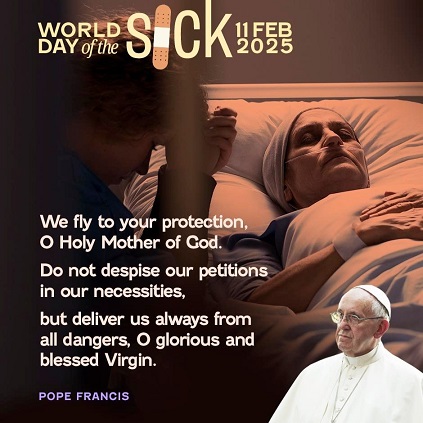
Established by St John Paul II,
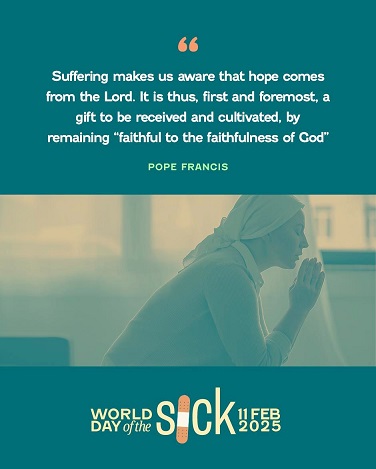
on this day we remember the sick,
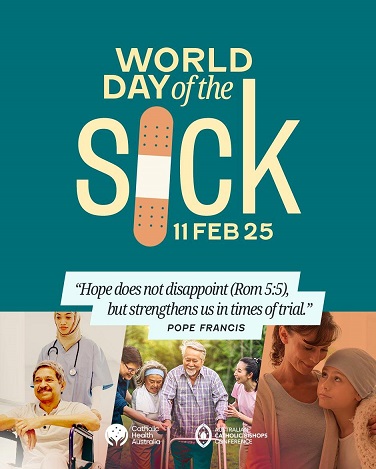
especially of the Chevalier Family worldwide,
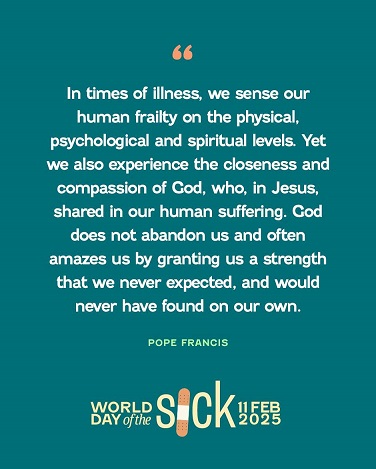
but a focus on Australia and our men in care at St Joseph’s, Kensington.
Celebrating 20 Years of Dedicated Service in Wadeye – Fr Leo Wearden MSC
Celebrating 20 Years of Dedicated Service in Wadeye – Fr Leo Wearden MSC
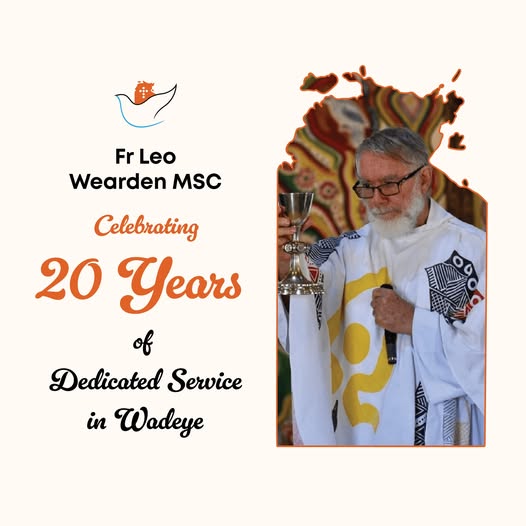
Tribute from Bishop Charles Gauci, Bishop of Darwin.
Today, we give thanks and celebrate a remarkable milestone: Fr Leo Wearden MSC marks 20 years of tireless service in the remote community of Wadeye. For two decades, Fr Leo has embodied the heart of Christ through his compassion, steadfast commitment, and deep love for the people he serves.
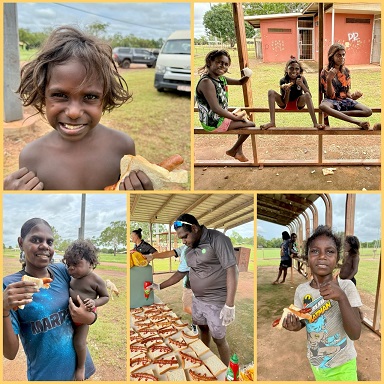
Fr Leo has been a priest for 45 years, and his missionary journey has taken him to many places where his service has left a lasting impact. His ministry has included time in the Tiwi Islands, Papua New Guinea, and East Timor - places in which he retains a strong interest and close connection. These diverse experiences have enriched his ministry and strengthened his ability to walk alongside communities with respect and empathy.
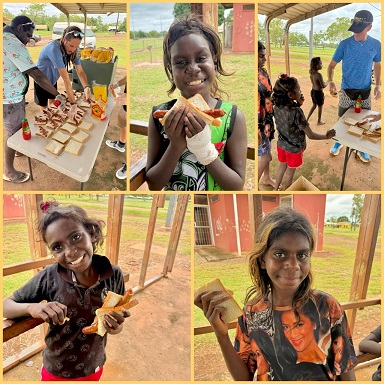
Wadeye is a place of deep history, resilience, and cultural richness, and Fr Leo has played a key role in fostering mutual respect and understanding between faith and culture. His commitment to walking alongside the local Aboriginal community is an example of what it means to live out Pope Francis’ call to be a Church of encounter, dialogue, and care.
I extend my heartfelt gratitude to Fr Leo for his courage, humility, and perseverance. The bonds of trust and friendship he has built in Wadeye over these 20 years reflect the profound impact of living out the Gospel with sincerity and love.
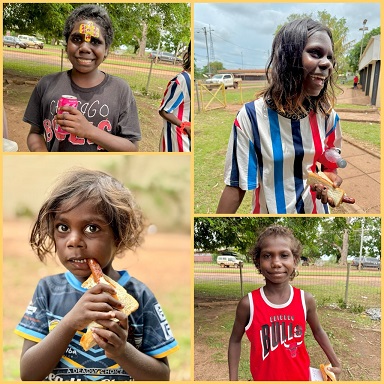
On behalf of the Diocese, I thank you, Fr Leo, for your service, sacrifice, and example of missionary spirit. May the Lord continue to bless you with strength and joy as you continue this mission. You are a living witness to what it means to serve with compassion and fidelity.
With the warmest blessings and gratitude,
+Charles

Croydon Monastery, Down Memory Lane, Ground Floor
Croydon Monastery, Down Memory Lane, Ground Floor

A January visit to the Monastery, now Sacred Heart Parish, Croydon. Previous posts have shown the chapel extensions to become the parish church.
Now we move around the cloister to check whether those of us who studied or worked at Croydon remember what these locations looked like.
The top photo is from the centre of the cloister at the entrance to the stairs
Check your memories of the laundry

And the kitchen

The scullery looks much the same
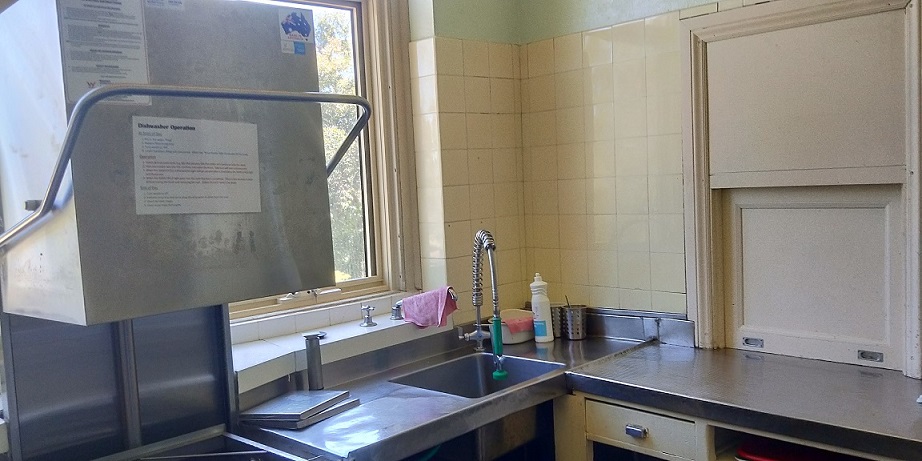
The dining room even more so (tables and chairs are the same as we knew them)
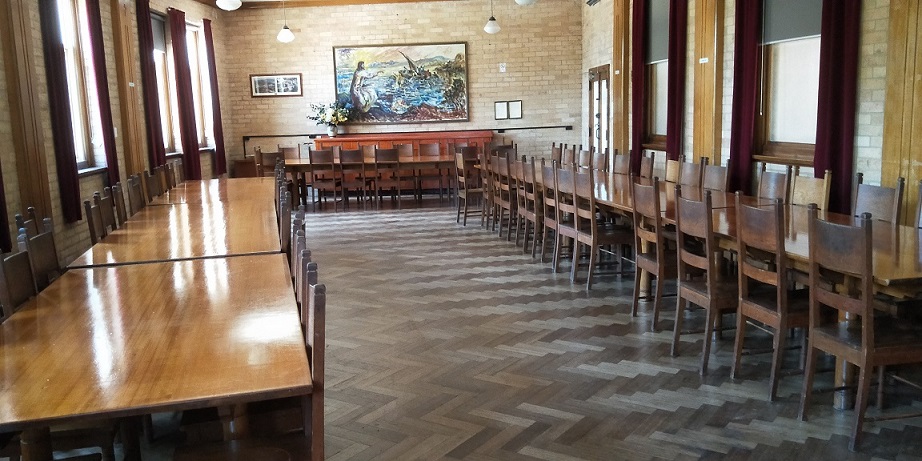
And Patrick O'Carrigan's large painting is still in place after almost 50 years.
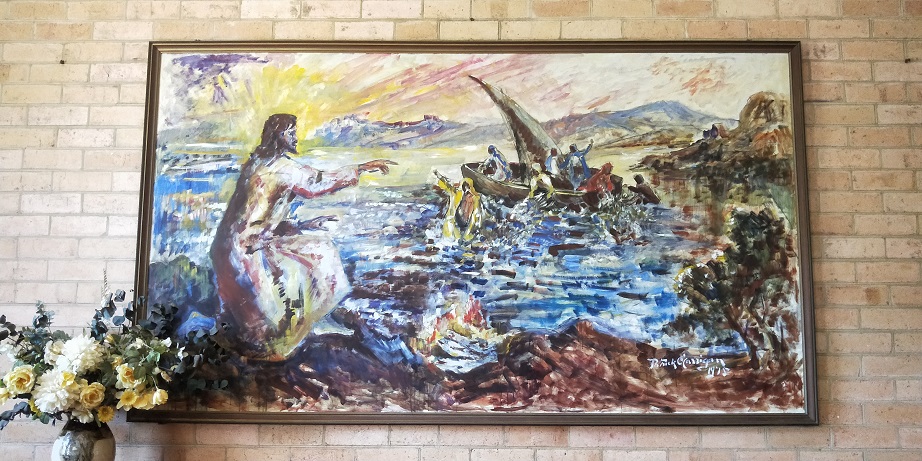
Who would have thought the theologians’ class room would look like this?
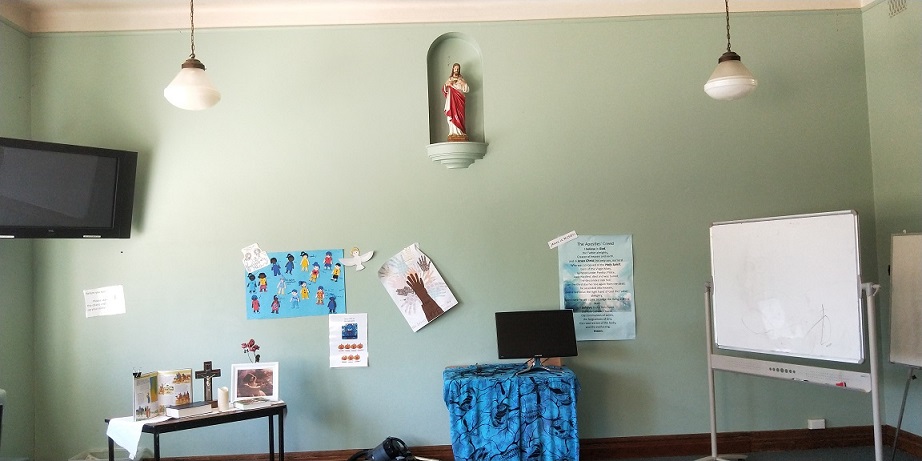
Even more so this renovated “Fathers’ recreation room”?

Next Croydon post we will go upstairs.
Chevalier Family Justice and Peace, First Friday
Chevalier Family Justice and Peace, First Friday

Conversion means putting on the mind of Christ,
trusting in the Father's love,
obeying God's will,
seeking holiness of life,
and growing in love for others.
And acknowledging the wit and challenge of The Naked Pastor

Deepening personal prayer is a significant means toward growth in holiness in daily life.
PNG Mission activity and challenges in the 21st century
PNG Mission activity and challenges in the 21st century
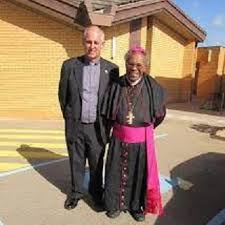
Brian Cahill writes from Tapini, Diocese of Bereina, PNG where he has lived and worked for almost thirty years:
I've just had a few stressful days working through appointment issues for our teachers appointed to Catholic Agency schools in the Tapini Area. It all has to do with false and misleading postings put up for teachers appointed to our schools. Originating from government officers overstepping their authority. Their are only two appointment authorities under the Education Act 1983: the agency being the recommending authority and the PEB being the appointment authority (acting on the recommendation of the agency).

The appointments posted at Konedobu for Goilala schools contained multiple errors, not reflecting the recommendation of the Agency or a decision of the PEB. Most telling were the so called tenure appointments put forward without the recommendation of the Agency that were all rejected by TSC and returned to the Province. WHO IN THE DIVISION OF EDUCATION OR GOILALA DISTRICT EDUCATION IS DOING THIS? ...NOT THAT WE DON'T KNOW!
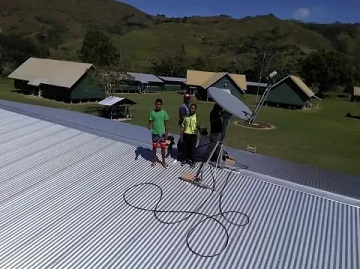
Moreover to stage a signing of resumption forms on mass at the Granville Hotel yesterday, rather than in the district, is a total disgrace. The DEC, School Inspectors, Appointment officers and whoever else on the government side of things with education responsible for this should be charged. The Granville is where you buy beer, not resume duty as teachers! This gathering was orchestrated through the bugle call of phone messaging (largely done by black listed teachers with the agency) trying to pull teachers into a resumption activity contrary to the lawful instruction given by the Agency through the CES. This is confusing to our young teaching officers, who are left questioning what is going on. Things are hard enough given the situation in Goilala. Government officers with your own agenda, back off and respect the role of the Agency. Stop this corruption! CC, Governor, Member, Goilala CEO, PA, Education Adviser, Bishop.
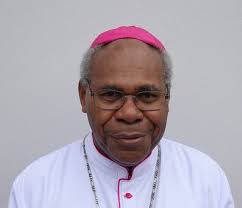
Rochus Tatamai MSC was Bishop of Bereina in the past. He is now Archbishop of Rabaul. He wrote:
Thank you Fr Brian Cahill MSC for raising this ongoing and chronic pandemic that undermines and destroys the mutual spirit of genuine partnership for the sake of the common good of our younger generations and for the promotion and enhancement of proper integral human development. As a major player in the development of this beautiful country, the state agencies responsible for delivering quality services. Education in this regard, there had been chronic disrespect and lack of commitment in the spirit of true partnership for the sake if the common god of our people. We will not sleep nor be silent until both the letter and the spirit of the Unified Education Act is restored and upheld to its full integrity and dignity.
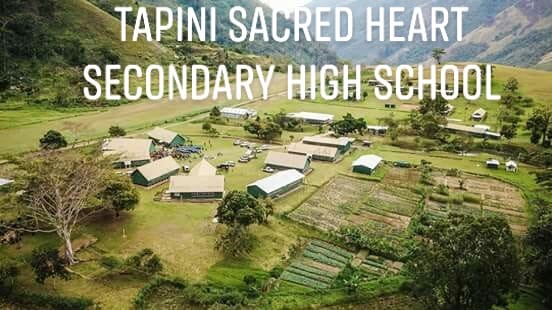
Glassworker, The
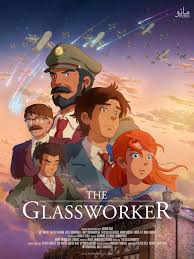
THE GLASSWORKER
Pakistan, 2024, 98 minutes, Colour.
Voices of: Art Malik, Sacha Dhawan, Anjli Mohindra, Tony Jayawardena, Teresa Gallagher.
Directed by Usman Riaz.
The Glassworker is the first animated film from Pakistan. And it has hand painted animation rather than CGI. And, it has a debt to the styles of Japanese anime.
The film focuses on a father and son, the father and expert class blower, instructing his son, homeschooling, confidence in his son’s talent and artistic imagination, derived from his now deceased mother. So, many beautiful sequences of glass blowing, glassmaking, finished products.
The young son, Vincent, is spurned by the local boys, encounters a young girl who comes into his shop, the various ups and downs of the relationship, especially with the theme of war, rather vividly portrayed by the animation, Vincent’s father a pacifist, looked down on by the militant population, admiring the general in charge. The young girl emerging as his daughter.
Over the years, friendship, misunderstandings, the daughter a talented violinist, inviting Vincent to her recital but his being prevented entry by prejudiced guards. Later, the adult Vincent has an exhibition of his glass artwork in the city – and an imaginative meeting again with his lost love.
The Director, Usman Riaz, co-wrote the screenplay and also composed the quietly plaintiff score.
- Title, audience fascination with glassblowing, the process, the quality of the sand (and the beach nearby), the fire, the blowing, the moulding, the cover? The finished products and their beauty?
- The style of the animation, and drawings, the different characters, the settings, the home and the glassblowing, town, the buildings, the cliff and the sea, the cave? The tone and melodies and orchestrations of the score?
- The vividness of the war sequences, the military, parades, fighting, the plains, the bombs, the devastation, the fires?
- Thomas Oliver, the glassblower, the story of meeting his wife, her talent, her death? Living with his son, Vincent, a young boy, learning the trade, his skills, his imagination, the various objects created? The bond between father and son,, keeping him at home, boy wanting to be at school, is ridiculed by the others? The years passing, the talent?
- The moving between times, the adult Vincent, relationship with his father, his father support, the plan for the exposition, the planning of the program?
- The encounter with Alliz, in the shop, his dropping the flower, her saving it, the beginning of the bond between them, her mother taking her away, the military parade, and the carriage, her father the military commander? A character, going to the boarding school, her talent with the violin, the fellow student carrying the instrument everywhere, the boys and their attention? Her skill at playing, the teachers?
- The war, the parade, Thomas and his shouting, his pacifism, reputation the town, Vincent suffering? The confrontation, the threats to take Vincent away, his collaborating with the glassware for the war effort, the bombardments? Father and son working together? Vincent, a crisis, his emotions, tampering with the products, the lowering of the chests to the shore, his father’s reaction, lifting they carton, losing his arm? The repercussions for Vincent?
- Later, the meetings with Alliz, he showing her the glassblowing, his father ordering her out? The meetings, the conversations, the gift, Vincent’s comment that she needed inspiration for her out?
- Allize and her success, the recital, the invitation, Vincent dressing up, being held up by the prejudiced guard, losing the invitation, not being admitted, on the roof, hearing her performance? In honour of her father, his being rescued, the flashbacks to the military action, the young man and his heroics, the father being saved, kissing the young man, Vincent upset?
- The adult Vincent, his exposition, the quality of the artwork, his father speech, the admiration of the crowds?
- The finale, the style, the aspects of magical realism and the Magic presence? The beach, Alliz and her reappearance?
Complete Unknown, A
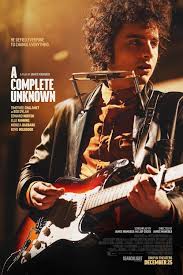
A COMPLETE UNKNOWN
US, 2024, 141 minutes, Colour.
Timothee Chalamet, Edward Norton, Elle Fanning, Monica Barbaro, Eriko Hatsune, Scoot McNairy, Dan Fogler, Boyd Holbrook.
Directed by James Mangold.
For audiences with long memories, singer-songwriter, Bob Dylan, has been a constant presence since he first went to New York City, aged 20, in 1961, made contact with Pete Seeger, admired Woody Guthrie, was given opportunities to sing in clubs, at festivals, and to record. And, he has done so ever since, awarded the Nobel Prize for Literature in 2016 for having created new poetic expressions).still at work in his 80s.
For younger audiences, becoming aware of the Bob Dylan of later years, memories of his songs, his contribution to folk music, his developments and musical talent, may have made a strong impression.
Which means that this two-hour 20 film about Bob Dylan’s earliest years, from a complete unknown in 1961 to a star, acclaimed, also criticised for his transition from folk to electric instruments in developing music styles at the Newport Festival in 1965, will be a significant experience.
And, there is the performance by Timothee Chalamet as Bob Dylan, a physically slight figure, characteristic wavy hair, intent on singing, writing his lyrics, always with a cigarette in his mouth, bringing Dylan to life. (In 12 months to Timothee Chalamet has been Wonka, Paul Atreides in Due 2 and now Bob Dylan, indicating that in his talent, Chalamet is a screen chameleon. It is worth seeing him in interviews as his ordinary self to appreciate his versatility )
Not that Bob Dylan in his early years was always an attractive character to meet. He was self-obsessed, ambitious, intent on writing and composing at all times and all places, fickle, often casual and of-hand, in relationships, especially with singer Joan Baez – but this is a young man in his early 20s. But he knows what he wants for himself and his creativity and career.
However, one of the great values of director, James Mangold’s film is situating the early songs, including some songs from Woody Guthrie and Pete Seeger as well as Blowing in the Wind, The Times are Achanging and quite a catalogue of other songs. And, impressively, Timothee Chalamet sings all the songs himself, plays the guitar and harmonica. In fact, all the supporting cast do their own singing, Monica Barbaro impressive with a beautiful voice as Joan Baez, Ed Norton in a very impressive performance as a sympathetic Pete Seeger, Boyd Holbrook as Johnny Cash. (Incidentally, James Mangold directed the film portrait of Johnny Cash in 2005, Walk the Line.)
There are some moving moments at the beginning of the film and at the end with Pete Seeger present and singing for a chronically ill Woody Guthrie in hospital.
Bob Dylan has been a significant figure in American and world music for more than 60 years. This is a welcome opportunity for us to go back to this introduction to a complete unknown.
- Audience response to Bob Dylan? In the early 60s, from unknown to celebrity, 1965 and his changing of music style, the succeeding decades of success, Nobel Prize for Literature, continuing into his 80s?
- The focus of this film, 1961-1965? Audience knowledge of the period, in the world, the Berlin Wall, the Cuban crisis, the assassination of Kennedy, the March on Washington, the Vietnam war…? The insertion of this information into the narrative?
- The music styles of the 1950s, popular songs, the place of folk, the influence of Woody Guthrie, Pete Seeger, Joan Baez and others? The influence of Bob Dylan, his music, lyrics? The peace movement? (And other movements in this time, The Beatles, Elvis Presley, The Rolling Stones…?)
- The opening and Woody Guthrie’s So Long…, Pete Seeger in court, the judge, the song, the support, This Land is my Land…?
- The atmosphere of New York City in the 1960s, the venues for concerts, the Newport folk Festival, Monterey? Recording studios? Flats and apartments?
- The music, the range of Bob’s Dylan songs throughout, their insertion, the film as a collection of his songs? Woody Guthrie’s songs? Pete Seeger’s? Guitars, harmonicas? The transition to electric, bands and the range of instruments?
- Audience response to the character of Bob Dylan, in these four years, aged 20 to 25, unknown, the way he presented himself, his obsession with music, his ambitions, relationships with Joan Baez, with Sylvie, how committed? The focus on his self-absorption, the consequences, some arrogant behaviour, his devotion to Woody Guthrie, appreciation for Pete Seeger, the clash with him at Newport? Not a character one would like to meet in ordinary life?
- Sympathetic portrait of Woody Guthrie, ill, no speech, Pete Seeger’s visits, Bob’s admiration, the hospital, the song, his final visit to the hospital and complaining orderly?
- His background, enigmatic, Zimmerman, changing to Dylan, the story of the carnival, keeping his life in mystery? The opening, arrival in New York, wanting to see Woody Guthrie, going to the hospital, encountering Pete Seeger, singing the song, the response? Pete Seeger and his wife helping out, his composing, the children? The continued friendship with Seeger and his family?
- The opportunities, his continued singing, the scenes of his composing, the music, the lyrics, writing, typing? His being introduced by Pete Seeger, the response? Joan Baez and her singing, her response, his acclamation? The beginning of the relationship, Joan’s attitude, sharing the songs with him, at Sylvie’s apartment? The later relationship, the clashes, even on stage, his turning up at her apartment, composing, her ousting him? Her later accounts of the relationship? The songs?
- Meeting Sylvie, at the church, talking, together, seeing Now, Voyager, the cigarettes, the comparisons with the story? (And the prevalence of cigarettes throughout the film?) Sylvie, her personality, her art, the attraction to Dylan, the relationship, going to the concerts, her time away and his infidelity, her suspicions, the breakup, his returning, on the bike to Newport? The influence of The Times are Achanging?
- Going success, the records, the producer, latching onto him, staying with him, the other executives and their hopes? The record companies, the takes, the initial song and his missing the microphone, his increasing competence and success? Appearances, a claim? People seeing him in the street pursuing him, escaping the taxi? The claim at the concerts, applause, standing ovations? His later speech and denunciation and people’s puzzle?
- The discussion with the young musician, going to see him play, their working together, the transition to electric guitars, bands?
- The background of the Newport Folk Festival, the personnel, the discussions, the tradition, Pete Seeger and his investment? Successful years? 1965, Dylan and his choices, the public wanting Blowin’ in the Wind and other classics? His refusal, the clash with Joan Baez? Sylvie departing and the final talk with her? His concession to a popular song?
- The clash with Pete Seeger, the interventions of his wife? Dylan, his friends, going to the new phase of his life, wanting to continue and develop the music?
- The final information, his relationship with Pete Seeger and reconciliation, with Joan Baez, the continued success? His career, the Nobel Prize and his not attending? Into his 80s and his approval and consultation for the film?
Sing Sing
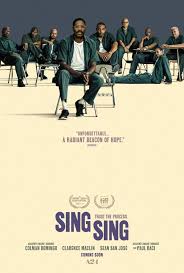
SING SING
US, 2023, 107 minutes, Colour.
Coleman Domingo, Clarence Maclin, Sean San Jose, Paul Raci.
Directed by Greg Kwedar.
Sing Sing is one of the United States most well-known prisoners, in upstate New York, on the Hudson River. And it featured in early films, 20,000 years at Sing Sing with Spencer Tracy and Bette Davis in the 1930s and subsequent locations for various prison thrillers.
This is not that kind of film.
For some time at Sing Sing, there was a program RTA, Rehabilitation through the Arts. This Is what this film Is about, a focus on the prisoners themselves, their response to Theatre, the effect on them personally, for morale in the prison. It was based on an article of 2005 in Esq magazine, written by John Whitfield who is the central character of this film. (In 2005 there was a documentary, set in California, Shakespeare Behind Bars, with the same theme.)
Of course, there are some scenes in the yard, the sudden siren and prisoners having to prostrate themselves, some focus on the cells some harassment of guards ransacking belongings in cells… But, the perspective of this film is very positive.
The principal feature is the fact that most of the cast consists of actual prisoners from the past or the present, re-acting what they lived through with this theatre rehabilitation. On face value, literally, they don’t seem likely candidates for drama but tough, one with a tattooed face, mainly African-Americans, in fact. They enter into this film with great zest, the discussions, exploring their characters, discussing whether to put on comedy or drama, finally opting for comedy.
But, at the centre, is the character of Whitfield himself, wrongly convicted, long time in prison, turned down by parole boards, but writing creatively, plays for the prisoners, part of the steering committee for the theatre group, coaching, acting. And along with him is the director, who comes from outside, long time working with the prisoners, writing the plays, some powerful scenes where he trains them, directs them in movement, has some quietly closing their eyes, contemplating memories of a friend, encourage and to express what they have seen and felt.
There are two other prisoner characters, a great friend of Whitfield, following him around, full of enthusiasm and suggestions. His played by an actor, Sean San Jose. The other principal character is the former prisoner, Clarence Maclin, replaying his own experiences, drug dealing in the yard, any demands from the dealer, it interested in the theatre, initial clashes with Whitfield but forming a bond, the audience understanding the impact of the rehabilitation through watching him, his Hamlet soliloquy, the director urging him to intensity, his moods, his developing a relationship with Whitfield, support for him when Whitfield breaks after an interview with the parole board.
Colman Domingo has won many awards for his portrayal of Whitfield, many nominations including Golden Globe and Oscar. For this reviewer, the film could have been longer, more development of the prisoner characters in themselves, more scenes of rehearsals and performance. But, Domingo holds it together on the whole project is, of course, a most worthy cause.
- Audience knowledge of Sing Sing, prison, history, eye security, guards and administration? This film’s focus on the group of prisoners, and the work of Rehabilitation through the Arts?
- The views of the prison, outside, the Hudson, trains? Inside, the yards, the cells, rehearsal rooms, theatre? Musical score, final song?
- Nominations for awards, Coleman Domingo’s performance, the professional members of the cast, most of the cast as former prisoners, prisoners, reliving their experiences?
- The atmosphere of the prison, comparative freedom for the theatre group? Scenes in the cells, sharing, discussions, conditions? Harassment of the prisoners, sirens and falling to the ground in the yard, visiting the cells and wrapping them up…?
- The film based on the reality of the Rehabilitation for the Arts, John Whitfield's article Esq, 2005? His story? Long years in prison, meetings with the Parole Board, the focal meeting, the documents, the accusations, the lack of evidence, the crime, his innocence, the phone call to his mother? His children? His career in writing, the players, the performances?
- The introduction to the range of prisons, their appearance, characters, actual prisons and experience, the use of their audition videos in the film? Their interest in theatre, the discussions, the steering committee, discussion about drama or comedy, the interchanges, the initial visuals of their performance at the credits, the audience interest in what they could achieve?
- The director, his working with the group, his personality, encouragement, they’re welcoming him? The discussion about the play, the comedy, the range of ideas, from Hamlet to Freddy Krueger, his going away, writing a text, bring it to them, their responses? The scenes of him training them, walking, shooting their eyes and imagining, communicating their images?
- Clarence Maclin, in the yard, the drugs, the young man, the bad drugs, $500? His relationship with Whitfield? The nicknames of Divine? The gradual bonding, the discussions, the issue of Hamlet’s soliloquy? Macon and his attitudes, with the group, surly, gradually harmonising, succeeding, his encouragement to be intense with the soliloquy? The later scenes, the discussions with Whitfield, sitting with him, supporting him, helping Whitfield come out of himself? Final performances?
- The character of Mike Mike, professional actor, sharing with Whitfield, their discussions, following him round, ideas, creativity, his loss with the group, their response?
- Whitfield, his character, strengths, moments of depression, intervening, encouraging? The bond with Mike Mike? With Maclin? The impact of the board meeting? The documents, Maclin and his being able to leave?
- The rehearsals, the costumes, performance, happiness, the absurdity of the play, the women coming in for their roles? The director? Whitfield and his interruption, disastrous, the reactions?
- Whitfield persuaded to come back, the performance, the success – and the collage of sequences, especially drawing on those from the actual past?
- Whitfield, quiet, reflecting, his leaving, meeting with Maclin, the exhilaration of freedom?
